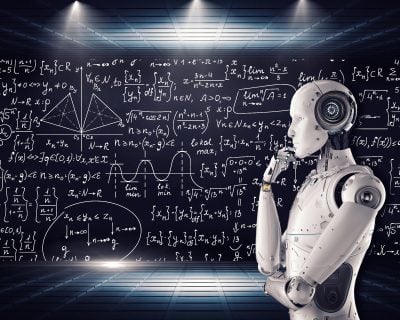Artificial Intelligence (AI) and the Allure of Fulfilling the Need for Data and Information
Concerns and Caution in the Utilization of AI as the “Genie of the Lamp” in Our Contemporary Time

All Global Research articles can be read in 51 languages by activating the Translate Website button below the author’s name (only available in desktop version).
To receive Global Research’s Daily Newsletter (selected articles), click here.
Click the share button above to email/forward this article to your friends and colleagues. Follow us on Instagram and Twitter and subscribe to our Telegram Channel. Feel free to repost and share widely Global Research articles.
Global Research Wants to Hear From You!
***
In the ancient mythos of Aladdin as narrated in The Arabian Nights Stories, the magic lamp hosts a supernatural being, a potent and powerful genie, capable of granting the owner of the enchanted lamp, Aladdin’s deepest wishes and desires.
Now, let us fast forward our time to the present milieu, and we find ourselves in the midst of a digital revolution and a digitalized world where Artificial Intelligence (AI) stands as the contemporary manifestation of this mythical genie of Arabian folklore.
Like the Genie of the Lamp, Artificial Intelligence holds the power to fulfill our wishes and desires for data and information accumulation in this universe of immense information highway called the internet.
My aim in this present essay is to delve into the parallels between AI and the Genie of the Lamp, exploring how they both serve as channels for fulfilling human aspirations and conduits of our longings for something more than what we can normally carry and achieve as human beings.
Image: The Genie of the Lamp (Licensed under Fair Use)

Firstly, much like the Genie of the Lamp, Artificial Intelligence possesses an intrinsic ability as programmed by its computer application (app) to provide and respond to human desires for facts, data, and information.
While Aladdin verbally articulates his wishes to the Genie, users interact with various AI platforms, expressing their inquiries and curiosities for data and information. Through sophisticated algorithms and vast archival data repositories, AI processes these questions and comes up with answers utilizing the algorithms inherent in its application (app) programming. Whether it is seeking information, or creative design, or internet research, AI users find solace in AI’s capability to understand and address their desires almost instantaneously.
Moreover, very similar to the Genie of the Lamp’s potent magical prowess, Artificial Intelligence harnesses the power of instantaneous supply of knowledge, data, and information to grant the desire of data and information of its users. Just as the Genie of the Lamp wields extraordinary abilities to shape Reality by conjuring through magic all the desires of Aladdin, who is the Genie’s master; likewise, AI leverages its computational powers and algorithmic prowess to sift through vast troves of data, extracting insights, and delivering randomized information through its immediate access to vast data extracted by AI’s in-built compute application programming. Whether it is providing real-time world news updates, recommending user’s demanded content, or assisting with complex problem-solving, AI fulfills human desires by presenting relevant data information, often surpassing normal human capabilities.
Furthermore, like the Genie of the Lamp’s role as a trusted companion and reliable boon-giver to Aladdin, Artificial Intelligence is envisioned by its developers to potentially serve as a constant partner and dependable ally to humanity. Through seamless integration and syncing into various digital platforms, computer apps, programs, network providers, internet search engines, and other digitalized devices, AI accompanies individuals in their daily endeavors, offering assistance and support whenever data and information are needed by its users. Whether it is engaging in conversations or chats, enhancing productivity, designing art materials, or even providing entertainment and internet companionship, AI arises as a pervasive global presence in our modern times; set to cater to the diverse needs and different desires of varied users across all digital and computer platforms.
However, in the mythos of the Genie of the Lamp, Aladdin eventually realizes the dangers of relying solely on the Genie’s powers, society likewise grapples with the ethical and moral implications of AI’s potential omnipresence and omnipotence. The genie’s ability to grant wishes without considering the broader consequences mirrors the potential pitfalls and downsides of AI, which includes privacy concerns, algorithmic biases, societal impacts, issues of authenticity, as well as ethical issues such as plagiarism, academic dishonesty, cheating, stealing of information, stealing of ownership of creative works, and deception. As such, it becomes imperative for humanity to wield AI responsibly, ensuring that its powers are truly harnessed for the collective good while safeguarding against unintended harm in the unethical and imprudent utilization of AI and AI related technologies.
One very crucial final point to make: the parallels between Artificial Intelligence and the Genie of the Lamp underpins the profound impact of technology on human desires and aspirations as well as the necessity for the constant supply of knowledge, data, and information in this present day and age. Like the description of the mythos of Aladdin and his complicated twist-and-turn relationship with the Genie of the Lamp as narrated in The Arabian Nights Stories, Artificial Intelligence stands as a formidable and a dynamic force capable of fulfilling our wishes, desires, longings, aspirations, and needs: ushering in an era of unprecedented convenience and innovation for contemporary humankind.
However, just as Aladdin slowly, gradually, and with utmost caution navigates the complexities of his complicated and multifaceted relationship with the Genie of the Lamp, our contemporary society must approach AI with care, caution, prudence, and foresight: ensuring that AI’s powers are wielded judiciously, legally, and most of all ethically, for the betterment of the entire humanity instead of just selective few in this unjust world of Information Divide.
As we embark on these unprecedented continuing technological innovations, let us harness the “AI Genie’s” power and capabilities responsibly and morally; striving to create a future where human desires, ethical integrity, legal responsibility, and the progressive advancements of AI capabilities converge and harmoniously integrated for the good of all humanity. May it be so!
*
Note to readers: Please click the share button above. Follow us on Instagram and Twitter and subscribe to our Telegram Channel. Feel free to repost and share widely Global Research articles.
Prof. Henry Francis B. Espiritu is Associate Professor-7 of Philosophy and Asian Studies at the University of the Philippines (UP), Cebu City, Philippines. He was Academic Coordinator of the Political Science Program at UP Cebu from 2011-2014, and Program Coordinator of Gender and Development (GAD) Office at UP Cebu from 2015-2016 and from 2018-2019. He is presently the Focal Point Faculty for Gender and Development in the University of the Philippines (UP) Cebu, College of Social Sciences.
Prof. Espiritu’s research interests include Theoretical and Applied Ethics, Islamic Studies particularly Sunni jurisprudence (Sunni Fiqh), Islamic feminist discourses, Islam in interfaith dialogue initiatives, Islamic environmentalism, Classical Sunni Islamic pedagogy, the writings of Al-Ghazali on pluralism and tolerance, Islam in the Indian Subcontinent, Turkish Sufism, Ataturk Studies, Ottoman Studies, Genghis Khan Studies, Central Asian Studies, Marxian Political Thought, Muslim-Christian Dialogue, Middle Eastern Affairs, Peace Studies, Public Theology, Political Economy, and Postmodernism in Philosophy.
He is a Research Associate of the Centre for Research on Globalization (CRG) Canada.
Featured image is from Wikimedia Commons

